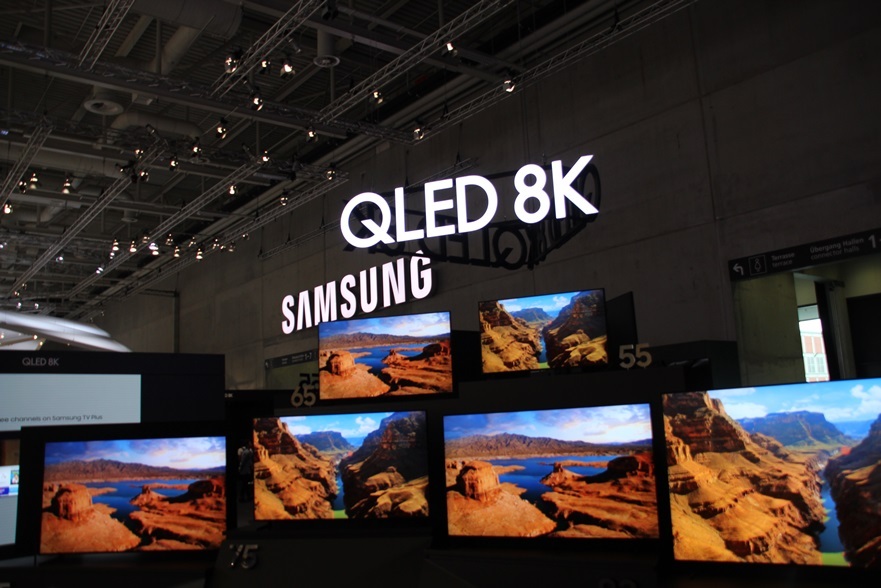[IFA 2019] Korean tech titans flex muscle at Europe’s biggest electronics show
LG to expand artificial intelligence; Samsung brings out Galaxy Fold
By Lim Jeong-yeoPublished : Sept. 5, 2019 - 18:01
BERLIN -- IFA 2019 kicked off Friday at Berlin ExpoCenter City’s 180,000-square-meter venue three times the size of Seoul’s Coex exhibition hall.
Some 1,800 consumer electronics companies gathered from across the globe to showcase their latest and most prized products. Over 100 Korean companies are exhibiting at IFA 2019, including Korean tech titans Samsung and LG Electronics.
Both Samsung and LG are showcasing flexible screen technologies; Samsung through the de facto virgin introduction of its commercial foldable 5G smartphone the Galaxy Fold and LG through its rollable TV, the LG Signature OLED R.
Some 1,800 consumer electronics companies gathered from across the globe to showcase their latest and most prized products. Over 100 Korean companies are exhibiting at IFA 2019, including Korean tech titans Samsung and LG Electronics.
Both Samsung and LG are showcasing flexible screen technologies; Samsung through the de facto virgin introduction of its commercial foldable 5G smartphone the Galaxy Fold and LG through its rollable TV, the LG Signature OLED R.
edited by Kim Young-won and Cho Hye-su /The Korea Herald)
Samsung had previously introduced the foldable phone at the “Unpacked” event in San Francisco in February, with a goal to commercially launch in April. The company was forced to reschedule that launch to coincide with IFA 2019’s launch day Friday, however, after taking more time to address faults found in the prototype upon its release to media.
IFA 2019 is the first global event where consumers will be able to feel the phone and have a measure of what functions it can provide.
Using the world’s first Infinity Flex Display, the foldable phone boasts a 7.3-inch-wide display when opened and 4.6-inch display when shut.
The Samsung Galaxy Fold launches in Korea on Friday and will gradually start sales in the UK, France, Germany, Singapore and the US in Long-Term Evolution (4G) or 5G network versions.
Other 5G phones from Samsung that have already been commercialized, the Galaxy A90 5G and Galaxy Note 10, are also on display at IFA.
LG, on the other hand, adorned the entrance to its 3,799-square-meter booth area with gigantic flexible signage consisting of 260 55-inch screens to create the effect of an organic light-emitting diode waterfall.

Inside, the world’s first rollable OLED TV, the LG Signature OLED R, is displayed automatically rolling up and down for visitors to check out the tech in person.
The TV maximizes the advantages of OLED technology, LG said. Unlike liquid crystal displays, OLED does not require backlit illumination and therefore can be thin and flexible. When not in use, the LG Signature OLED R will roll up to minimize the presence of a big black square screen in the interior design.
Samsung and LG have focused on honing their 8K technology that augments lower-resolution pictures through artificial intelligence and adds more pixels to enhance image quality for a bigger-sized screen.
In a press conference in Berlin a day ahead of the official IFA opening, Samsung presented in front of some 800 attendees that the company has completed the lineup for quantum-dot light-emitting diode 8K TVs with its latest 55-inch model. This new, smaller-sized 8K TV is to be sold in some 30 countries.
To expedite the growth of the 8K ecosystem, Samsung said it will actively support the creation of 8K content and collaborate globally with relevant companies.

For now, consumers can watch soccer’s English Premier League through the Amazon Prime app that comes with the Samsung smart TV.
LG, on the other hand, boasts the world’s biggest 88-inch OLED 8K screen, the LG Signature OLED TV. The screen delicately and freely utilizes nearly 33 million organic diodes for detailed resolution.
In order for a TV to pass as having 8K resolution, it must suffice both in the pixel count, or addressability, and the level of contrast modulation. LG said all of its 8K TV models comfortably meet the standards of International Committee for Display Metrology.
LG utilizes its original artificial intelligence service ThinQ Platform as well as Google Assistant and Apple AirPlay 2 for voice-controlled internet of things functions.
The company’s President and Chief Technology Officer Park Il-pyung said at a panel ahead of the IFA opening that with LG’s AI, “Anywhere is home.”
Evolve, connect and open are the three key strategies for LG’s AI, Park added, saying that will allow consumers to enjoy maximum comfort from anywhere through hyperconnectivity. LG has plans to expand the product lineup of the company’s AI brand LG ThinQ.
“An AI product grows to know the user better over time,” Park said, “LG Electronics has developed an original AI chip that is optimally designed for household appliances to self-learn.”
LG’s AI chip imitates the human neural nerve network. Called the “LG Neural Engine,” it boasts of deep-learning ability that is on-device and can function even without a network. The user’s personal data is safely stored and protected within the chip, according to LG.
Park said, “Smart TV, refrigerator, car and building will evolve, connect and open up to each other for users’ better life. With this connectedness, our consumers will feel home-like comfort from anywhere.”
In order for voice-controlled AI to harness new possibilities, visual intelligence has to support it, Park stressed, introducing LG’s Vision Pack image sensor linked to the cloud server.
“An LG Styler with Vision Pack can process the clothes hanging inside the smart wardrobe according to textile type and autoset the best way to care for it,” Park said.
In another example, Park unveiled for the first time LG’s ThinQ Fit, which uses a 3D camera to measure a person’s size and create a virtual avatar that can be brought up on a screen or mobile device for the user to virtually try on different outfits. Through connected sellers, users will be able to make online purchases of the clothes.
Samsung is also displaying its 5G semiconductors Exynos 980 and Dynamic Vision Sensor. The Exynos 980 is Samsung Electronics’ first 5G System on Chip, which has a Neural Processing Unit that is optimized for compatibility with artificial intelligence and 5G mobile technologies.
The DVS, on the other hand, can recognize minute movements and is deemed applicable to virtual and augmented reality programs, mobility and home IoT.
Other iconic products from the two Korean companies, such as the smart wardrobe, washing machine, air purifier, robotic vacuums and more are on display at IFA 2019.
By Lim Jeong-yeo (kaylalim@heraldcorp.com)
Korea Herald correspondent


![[AtoZ into Korean mind] Humor in Korea: Navigating the line between what's funny and not](http://res.heraldm.com/phpwas/restmb_idxmake.php?idx=644&simg=/content/image/2024/04/22/20240422050642_0.jpg&u=)
![[Exclusive] Korean military set to ban iPhones over 'security' concerns](http://res.heraldm.com/phpwas/restmb_idxmake.php?idx=644&simg=/content/image/2024/04/23/20240423050599_0.jpg&u=20240423183955)


![[Herald Interview] Why Toss invited hackers to penetrate its system](http://res.heraldm.com/phpwas/restmb_idxmake.php?idx=644&simg=/content/image/2024/04/22/20240422050569_0.jpg&u=20240422150649)

![[Graphic News] 77% of young Koreans still financially dependent](http://res.heraldm.com/phpwas/restmb_idxmake.php?idx=644&simg=/content/image/2024/04/22/20240422050762_0.gif&u=)





![[Exclusive] Korean military to ban iPhones over security issues](http://res.heraldm.com/phpwas/restmb_idxmake.php?idx=652&simg=/content/image/2024/04/23/20240423050599_0.jpg&u=20240423183955)



![[Today’s K-pop] Ateez confirms US tour details](http://res.heraldm.com/phpwas/restmb_idxmake.php?idx=642&simg=/content/image/2024/04/23/20240423050700_0.jpg&u=)